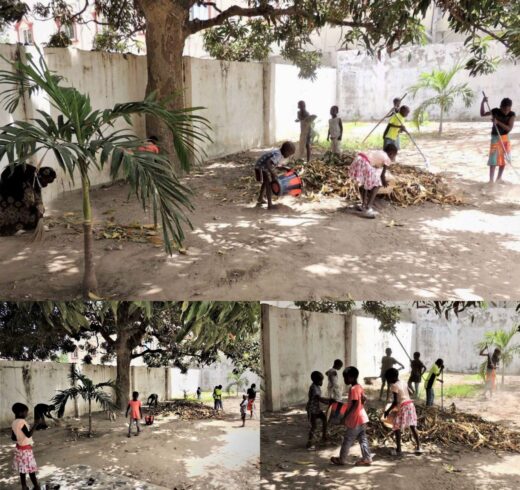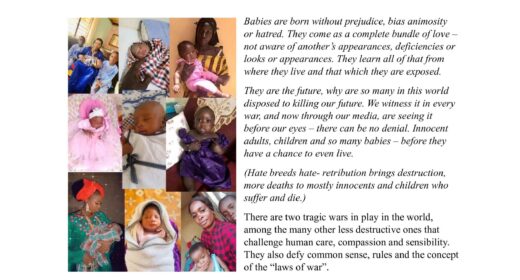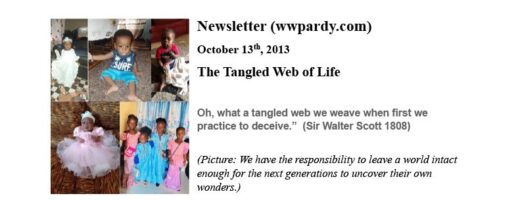
(Even children in a very poor country want to help and know how.)
I began to write this article about transitions but after some work realized that I was writing about the end of an era, which is different in that it involves many transitions plus the introduction of several new generations of people.
The last era began the end of the 18th century which ushered in phenomenal changes and many conflicts across the world. It encapsulated periods of turmoil including two world wars and a world depression, the like of which the world had not seen before.
It ended with the defeat of Hitler in Europe, and more dramatically the explosion of two atomic bombs in Japan which shocked the world with the destructive nature of these new weapons, and their potential to end the world.
That was the disastrous end of the last era, with its loss of human life, destroyed infrastructure and diminished organizations and governments.
The beginning of this current era started with a healing process, the return home of all the military, and displaced people. They began rebuilding their lives, communities and contributing to the economic renewal in the world. Peace in most of the world resulted in a population explosion, economic growth unseen in human history, and technological inventions, beyond imagination.
In western countries and in many others, democracy flourished, life was enriched, and the middle class expanded, and in time, life was relatively good. The cry following the war years was “never again.” New organizations were created, and institutions developed in a global, country, and community context. Governments became more open and supportive.
Community and social development took on a new meaning with the development of local organizations, and institutions: local employment in the social field provided a new field of opportunity.
Of course, these changes were not obvious everywhere, as there were still conflicts, authoritarian dictatorships, and repressive governments in place. This was most obvious in Russian control of Eastern Europe after the war. Communism was declared, the whole of Eastern Europe was closed to the rest of the world, and for the people who lived there, it was closed to them. And much of the world’s people suffered poverty, repression and often conflict.
But for those of us fortunate to live in the “developed world” life was good; progress was made, education expanded, and technological development grew beyond our wildest dreams. There was a concerted effort to encourage and support those less fortunate for a variety of reasons.
But over time, the old human trait of greed appeared, and government policies were slowly altered away from people and skewed towards enterprise. Business support and entrepreneurship took on new meaning, and over time, wealth was transferred and polarized to those most wealthy.
The economic polices developed after the war shifted, and recessions occurred caused mostly by these redirected economic practices creating imbalances mostly affecting the middle class and the poor. International support to the poorest countries was also redirected and changed leaving less for them as well.
This resulted in a super rich class, a diminished middle class, and growing numbers of poor and homeless in even the most developed countries. It escalated conflicts in the controlled and poorer countries and contributed to the collapse of the Soviet Union. The rise of conflict was a direct result of shifting economies and more stringent policies in countries with authoritarian governments.
The polarization of wealth also afforded those most rich the ability to influence democracies in the western world and as a result economic philosophies which favoured the rich were adopted by the governments under the guise of increasing wealth for everyone.
Government policies shifted to wealth creation and generation, despite the damage being done to the environment, to social structures and institutions – economics became the cry. Social support was diminished, considered too costly, and creating dependencies.
So, we now have arrived at the end of another era, less tragic than the last for most, but not for all. Divided government, communities and people with economic systems designed to enrich the wealthy, and diminishing support for those most poor are the norm.
COVID 19, is blamed for much of the desperation around the world. Other than killing millions of people, and isolating people, the pandemic exposed the shortfalls in the ability of our medical system and facilities to respond to greater demands.
It also uncovered the dysfunctions in other aspects of our institutions and governments. On the other hand, covid did bring people closer together, and made many realise how much we need and depend on each other in life, more so in times of disruption, trials, and tragedy.
We are now facing another generational transformation which is global. The “baby boomers” born after the end of the war and the beginning of this era are rapidly declining because of their age. That generation is being followed by several generations with lower birth rates.
For reasons related to the greater prosperity of their parents the following generations (Gen X and the Millennials) have had much more access to education and the ability to travel, so they have a much different perspective and a much different outlook on the world.
At the same time much of the outgoing older generation, especially those with wealth and power, are reluctant to let go and resist handing over to those younger with a much more social view on how the world should be transformed.
In most of the developed world we are seeing increased unrest as those younger react to their plight and watch many of their freedoms, and hard-won social and ecological enhancements being restricted. Youth, especially women, are much most vocal as they are now being denied many aspects of the progress that has been hard fought for by all generations of this era.
We are also seeing social organizations that were developed and designed for another time being depleted as they have not kept up with changes and not attracting young people who have different interests and concerns. Those older must realize that younger people have a different vision of the world and need support to bring their vision into reality.
Most young people have much more access to technology to gain understanding of the world around them. Because of more worldly exposure they have a greater degree of empathy, compassion, love, and acceptance of differences.
This bodes well for the world, because a world where there is more caring, sharing and love is a much better place.
In the early decades of this era, the “free love baby boomers” resulted in the large social movements that evolved in almost every developed country. At that time there was more focus on the philosophies of equality, equity and concern and less on the monetary economies of more and much.
There is a struggle going on in the world today, bigger than all the conflicts, and perhaps responsible for many of them, which is most important for humanity, and the world in which we live.
The most important players are the youth who have been raised by generation X, Millennial parents, and teachers, who desperately want life. A life where they can express themselves in the way they wish, with care, concern and compassion for all – no matter their differences.
They want a living flourishing world, and not one environmentally destroyed and societies that respect equity, equality and freedom for all.
The other participants are the old, rich, and tired (mostly) old men, who are on their way out of this life but still cling to power, with their wealth, and outdated beliefs wanting even more – they would rather destroy everything than give it up.
Of course, it is naïve to think that all of either faction fit these two descriptive personalities. Both factions have a mixture of both, and in life that complicates everything.
We know what happened at the end of the last era, with a nuclear blast. Hopefully, saner heads will prevail as the potential for nuclear disaster is beyond our imagination for everyone.
We only need look to Ukraine whose educated youth are at the front of the battle for the world today, with an inspiring young leader who has their best interests as well as all Ukrainians at heart.
They are fighting a war with a psychopathic old despot, who considers the young as cannon fodder so that he can control the world. Ukrainians are winning even as old western leaders hesitate to act or allow them to attack Russia on its own turf.
The world is at a similar pivotal moment as it was in 1945, only this time its being played out before our eyes in the critical war in Ukraine, and other smaller conflicts rather than in a great war like before.
The world has a growing number of authoritarian and dictatorial leaders in power or vying for power, even in the United States, largest democracy in the world. They are being supported by those with power and wealth.
They are using modern widely available technology to spread false information, propaganda and outright lies to influence people, many of whom still think the path to prosperity lies in control.
The fear of nuclear Armageddon is once again being used a bargaining chip in a world in turmoil, experiencing the greatest polarization of wealth in the history of humanity.
Government policies driven by the wealthy, and regional and country conflicts are creating increased poverty, despair, and migration at the same time as environmental disaster is staring us in the face.
The fate of the world once again rests with the young, and like those in Ukraine, they are starting to find their way, to take on the rich and powerful, and those who would oppress. This is happening in authoritarian and democratic countries alike, even those highly restricted countries like China.
If the world is going to have a future, they will need the support of those in the world, who are not so young, and who can see past the propaganda and false promises of those vying for power and control.
We must encourage the youth, support them and protect them as much as we can as they are the future and must ensure that a world exits for our grandchildren and those next to come. It is a big challenge, but as in other times in history everything is possible if humanity comes together with a belief in compassion, caring and sharing as the way forward.
There are many examples of people rising up, and taking back control from those would supress them. I have spent a good part of my life working in struggling communities, facing constraints, economic, and environmental challenges.
Overtime I had many mentors and much support as young people today could use along with united communities. I was introduced very early into two philosophies that guided others, one ancient and the other more recent, both proved fundamental in my approach and would be useful to others getting organized.
The first is an ancient Chinese philosophy which advises those who want to help in their community organization. It says: “Go to the people. Live with them. Love them. Start with what they know. Build with what they have.”
The second if from the Antigonish Movement in Nova Scotia during the 1930’s depression it was a concept the founding priests had seen at work in the United States.
Their process was “to gather people together in the evenings and sit and talk to provide average people unobstructed passage to wider fields of knowledge, self help, and security.” The organizers believed: “that real education springs from the hearts and pain of people.”
Both approaches are founded in people, their needs, capabilities and coming together. These and other such approaches that have been at play throughout the world and have been since people became organized.
The need for people to come together, especially the young has never been greater. If I have learned anything in my years of working with community in many places the world over – after being often told people are apathetic – is that they just need a little nudge, understanding and support to become animated.
Written by William (Bill) Pardy
July 7th, 2023


